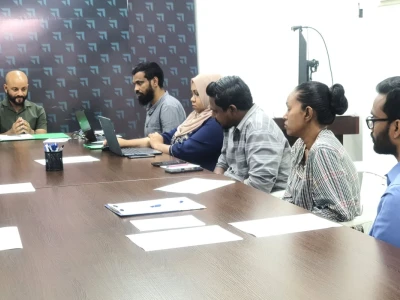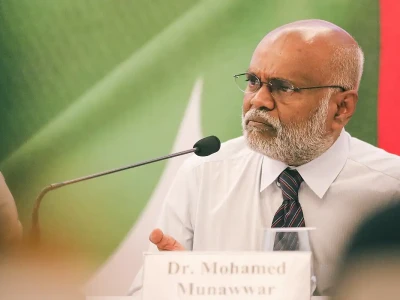
MRM maintains anti-govt stand in Chagos dispute, but slams opposition
MRM said in a statement that politicising such issues of national interest would make it difficult to win the case.
Top Stories
-
Ministry to assess repairs at Sinamalé, Malé Hiyaa flats
-
Authorities asked to probe blasphemous insults in TikTok live
-
Fine waiver, MVR 100k allowance for Sinamalé, Malé Hiyaa flats
-
Referendum on merging elections with April 4 council polls
-
Fenaka Saeed transferred to house arrest over health reasons
Maldives Reform Movement (MRM), part of the ruling coalition, said on Wednesday that even though the party opposes the government's policy on delimitation of the territorial waters between the Maldives and Chagos, the opposition's allegation that the government had "sold part of the sea" was an incorrect and politically motivated statement.
Although the party has expressed its opposition to the government's stand on the issue, MRM has not been part of the alliance formed by the political parties on the issue.
MRM said in a statement that politicising such issues of national interest would make it difficult to win the case.
"People's commitment to this cause is diminished by making unsubstantiated statements such as 'selling the sea' in order to defeat the interests of the people in order to achieve their political objectives," it said.
"Although this is not a political issue, some are taking up the issue as a political issue. We demand that the parties stop politicising such matters which are of national interest."
While Mauritius' plea to the international tribunal for delimitation cannot be considered as "selling part of the sea", MRM does not see it as a victory for the country either.
MRM believes that, according to the statement, the decision of the International Tribunal for the Law of the Sea (ITLOS) would undermine many of the economic benefits that Maldivians have enjoyed for a long time.
"Therefore, MRM considers this to be a great loss to the state and its people," the statement said.
The MRM statement highlighted on what substantiated the party's belief that the Maldives would be disadvantaged from the territory-allocation:
-
Loss of part of the sea where local fishermen venture out for fishing
-
Increase in poaching in the southern part of the country
-
The possibility of a decline in fish stocks across the country
-
Increased competitive activities, increased cost of monitoring the area, and the loss of opportunities for undersea exploration
-
The loss of future benefits to the country from the area that has been given up
-
Loss of opportunities from benefits of natural resources rich in the area such as seafood and medicinal resources
-
Missed opportunities for climate and disaster research in the area
-
The foreign value of managing the interests between Maldives and Mauritius is unmanageable; the nature of the case will increase the internal conflict and increase its defence value
-
The loss of strategic balance in the Indian Ocean and the fear of a sustained loss of stability in the region
-
The possibility of breaking national unity and opening up space for foreign hegemony
-
Adversely affecting the movement of free-flowing goods in the area
"MRM believes that it is in the interest of all stakeholders in the country's fisheries sector and everyone as a whole, but it should not have gone this far without consulting the mentioned parties," the party said.
The MRM also opposed the government's move to change its stand to recognise Chagos as part of Mauritius.
The Maldives has always voted against colonisation, but it has been reluctant to accept Chagos as a part of Mauritius as desired by Mauritius for a number of reasons, the party said.
-
When Mauritius was liberated from British rule, Chagos was not part of Mauritius
-
If Chagos becomes part of Mauritius, it will reduce the Maldives' economic area and undermine the country's natural resources in the economic zone
"As the case was settled, it has now reduced the economic area of the country and also hurts the fishing industry on which the lives of the indigenous people have been dependent on for a long time," MRM said.
MRM also expressed concern over the government's change of stance towards Chagos, not disclosing President Ibrahim Mohamed Solih's letter to the Mauritius prime minister conveying the message, and the government's failure to table the issue in parliament for review.




